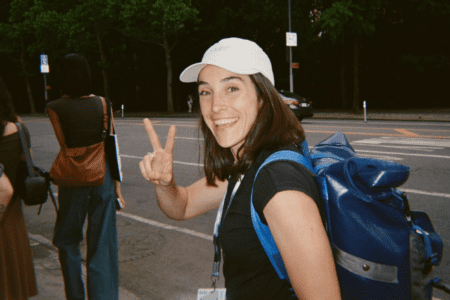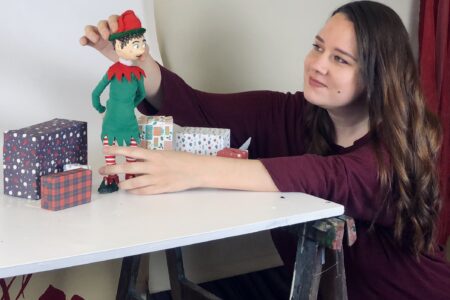
When people win awards, they’re often dressed to the nines. They’re surrounded by people before making their way to the stage to accept their trophy. A speech is given, and a celebration might follow after the event is completed.
When Rafif Kalantan won her first BAFTA Student Award for Games at the Yugo BAFTA Student Awards 2023, she was in her pajamas and alone in her flat’s living room, staring at her phone and waiting for a friend and representative teammate’s text about the nomination results. It was 3 a.m. UK time – 7 p.m. Los Angeles time, where the award took place.
She received the trophy in the mail six to eight months after the event. It was around the time she was helping out with another game that would lead to her second BAFTA Student Award win, which, again, Kalantan couldn’t attend the award for.
It’s nothing close to what Kalantan expected when she decided to pursue game development, but she’s here now – a two-time BAFTA Student Award winner, an MCV/DEVELOP 30 under 30 recipient, a London Games Festival 2024 Ensemble member, and a game and narrative designer.

From never considering a career in games to earning many new accolades that highlight her significant impact on the games industry, Kalantan has come far – and is ready to go further. Source: Rafif Kalantan
‘I never thought of making games as a career’
“When you’re having fun playing games, you don’t expect it to be a job,” says Kalantan. “You don’t think of the people behind the scene working on this.”
For her, gaming was just that – having a blast. It was definitely not a viable career option.
Born and raised in Jeddah, Saudi Arabia, Kalantan grew up with the same ideals everyone in the region (and outside of it) was taught: that the financially viable and respectable careers were being a doctor, lawyer, or engineer.
Kalantan did neither and instead chose to pursue a computer science degree at Effat University.
“Back then, around 2012, it really made sense to go into anything computer-related because you can tell that this is where the future is going,” says Kalantan. “You won’t be an engineer, but it’s close enough to what engineering is.”
It was during her degree that she had her first brush with game development. The Introduction to Java course required students to create a game out of code.
And if you know anything about making games, the first rule is to not code everything – something that Kalantan was woefully unaware of when she decided to recreate Space Invaders on the coding programme. Suffice to say, she found the project “really difficult, and it completely tarnished the idea of going into games.”

Had Kalantan (right) not come across a game development course during the third year of her degree, life would have been mighty different right now. Source: Rafif Kalantan
Luckily, an optional course during the third year of her degree changed her mind. The Game Development course introduced Kalantan to an actual game development tool, Unity, a powerful platform noted to be user-friendly, especially for beginners.
For Kalantan, that was the moment when things finally clicked – so much so that she even decided to create a game for her final year project.
The game, which Kalantan teamed up with a fellow student to work on, revolved around helping people with ADHD. The duo even managed to have children with ADHD test out the game and heard really positive feedback.
When Kalantan graduated with her bachelor’s, she immediately sought game development studios in Saudi Arabia to launch her career.
It was easier said than done.
As the industry was still developing, many game developers were protective of their work and unwilling to delegate to others. This meant little to no job postings or creative freedom to discover and build your own skills as a developer.
“So, where was I gonna go? I want to do games, but there are no game development studios,” says Kalantan.
In the end, Kalantan became an Interactive Developer, using Unity to create augmented reality (AR), virtual reality (VR), extended reality (XR), and interactive solutions.
A little over three years later, now comfortable with using the game development software and having participated in game jams here and there, Kalantan decided it was time to pursue her master’s degree.
What to expect from a game development programme
Kalantan was one of five students who earned Saudi Arabia’s NEOM scholarship in 2020. The full scholarship and her past expertise earned her a spot in the UK’s National Film & Television School’s (NFTS) MA in Game Design and Development programme.
The experience was eye-opening and exciting.
From tackling various projects, working with different departments to simulate real-world cross-team collaborations, and getting plenty of support from visiting and resident instructors, the programme was a real deep dive into what working in game development was all about.
One of Kalantan’s favourite modules was a game analysis class that had students play a game for a month before everyone would discuss what they felt worked, what didn’t, and how they would make it better. The games Kalantan played included “Disco Elysium,” “Metal Slug,” “Yuppie Psycho,” and the beta version of “Vampire Survivors.”
“It made me look at games in a lot more of a critical thinking perspective, and it also forced me to play games I’m not used to playing,” laughs Kalantan.
When she wasn’t playing games, Kalantan was developing them.

Kalantan’s MA in Game Design and Development final year project, “Eros Xavier’s Love Solutions,” was demoed for the first time at EGX London 2022 to extraordinary reviews from TheGamer, Rock Paper Shotgun, Gayming, and A Most Agreeable Pastime. Source: Rafif Kalantan
Her final year project, “Eros Xavier’s Love Solutions,” is a narrative-driven puzzle-like game following a retired cupid starting a private business for hire as a match-breaker. While Kalantan managed to work together with a sound designer and a screenwriter for the game, she was also taking up responsibilities in game, narrative, UX, and level design, game production, game direction, and more.
Her hard work led to a nomination and a win for the BAFTA Student Award for Games at the Yugo BAFTA Student Awards 2023.
Beyond a physical trophy, the award came with multiple titles, including:
- The first Saudi to win a student BAFTA award
- The first non-European (and Arab) to win this category
- The first female director to win this category
- The first win for a British school/university in this category
- The first win for NFTS in the games category, which coincided with the department’s 10th anniversary
- This nomination also marked NFTS being shortlisted for this award every year since it began
“Even just getting a nomination was very validating because it showed that I wasn’t just playing around,” says Kalantan. “Yes, I was having fun, but at the same time, I was actually working on something, and it did so well that it got a nomination, and it was like in all of these categories.”

“Eros Xavier’s Love Solutions” won Kalantan her first BAFTA Student Award for Games at the Yugo BAFTA Student Awards 2023. Source: Rafif Kalantan
For all the good news, the Saudi Arabian couldn’t get a visa to attend the ceremony in Los Angeles.
The earliest visa appointment she managed to secure was in December. An appeal was submitted and rejected too, so Kalantan offered the game’s screenwriter, British national Amy Tattersall White, to attend in her place.
“Amy had done so much for the game; she was at the forefront of it and was very hands-on, which I appreciated, so I asked her if she wanted to go, and she said yes,” shares Kalantan. “I was like, ‘Great, here’s an acceptance speech if we win – feel free to say whatever you want, but I’d like to thank these people too.’”
On the day of the award, Kalantan awaited a text from White as no live videos were happening. Instead of a text, however, Kalantan was alerted by an Instagram notification that the BAFTA account had tagged her on an announcement of the category’s winner.
“Amy texted me two minutes later, saying we won,” laughs Kalantan. “I didn’t know how to celebrate – like, did I win, or am I hallucinating? Should I go back to sleep? It was insane.”
That was when the articles about this major achievement started piling in. Soon enough, Kalantan was getting tagged by media outlets announcing the win and getting numerous requests for exclusive interviews as well. From Forbes Middle East and Marie Claire Arabia to VOGUE ARABIA and more, Kalantan was getting swamped by the press.
“The best point about it is that I was able to represent the region,” says Kalantan. “It doesn’t even stop at just my region too; I was able to represent so many different things.”

Kalantan was part of the London Games Festival’s 2024 Ensemble, which featured UK video games talent from Black, Asian and underrepresented ethnicities, championing game makers and industry influencers from a broad spectrum of roles and a wide variety of backgrounds. Source: Rafif Kalantan
“It’s incredible to showcase that, yes, people from outside of Europe and America can make good games, and these games can win awards,” Kalantan continues. “In the recent years, there’s been a bunch of games that have been made by really incredible people of colour, and it felt really good to kind of feel like I’m walking in the footsteps of these people.”
Kalantan’s achievements don’t stop there either.
In 2024, she supported a fellow junior and Saudi Arabian NEOM scholarship holder, Wid Alhajjaji, as a producer for Alhajjaji’s final year project, “There Was A Home,” a narrative-driven 3D puzzle game that follows a girl on her journey of self-discovery and reconnection with the history of her childhood home.
The game won the BAFTA Student Award for Games at the Yugo BAFTA Student Awards 2024, earning Alhajjaji her first win and Kalantan her second in the category. It was also the second consecutive year that a female Saudi student (from NFTS too!) won within the same category.

As part of her work to bolster the region’s game industry, Kalantan (middle) has attended numerous speaking events to share her experience and offer advice to those who wish to join the scene. Source: Rafif Kalantan
How to create award-winning games
“The thing about making new games is that there’s not a lot of room for innovation when it comes to mechanics,” says Kalantan. “So I think a lot of innovation comes from how you design them, and the story plays a huge part of it.”
Kalantan’s “Eros Xavier’s Love Solutions” took a dark comedy stab at people’s cynical views of relationships, while Alhajjaji’s “There Was A Home” introduced players to a culture in a very unpretentious way.
In 2024, Kalantan and a friend teamed up to develop “Um Al-Zaytoun,” which translates to “Mother of Olives” in Arabic. This is a point-and-click narrative game about the struggle of the Palestinian people since the Nakba (“catastrophe” in Arabic), which refers to the mass displacement and dispossession of Palestinians during the 1948 Arab-Israeli war.
The game tells the story through gentle, bite-sized conversations – an intentional design during its development.
“We don’t want to just focus on all the negative parts of the struggle,” shares Kalantan. “We wanted to focus on the rebuilding parts, so it’s basically an experience where you’re making olive oil with your grandma and she’s retelling stories about what happened.”
“Um Al-Zaytoun” won the “Best Integration of Theme” award at Just Play: A Game Jam for Justice, an official South by Southwest (SXSW) 2024 games event produced by Cinereach and Anima Interactive.
View this post on Instagram
“That was around the time I started focusing more and more on the Arab representation in games because whenever you play a game, if there’s an Arab, they’re probably a terrorist or something,” says Kalantan. “It’s so stereotypical. But Arabia, North Africa, and the Middle East are massive – there are so many different cultures and so many stories you can tell other than this false narrative that all Arabs are terrorists.”
With this in mind, Kalantan co-founded the Gamedev Initiative for the Global South (GIGS) with Ashraf Abi Said – with whom she worked on “Um Al-Zaytoun” – to make game development more accessible in the Global South. There, applicants get to join mentorship programmes and get courses on how to pave their own path in the industry.
The plan with GIGS, aside from offering new and abundant opportunities to those interested in game development, is to set the organisation up as a nonprofit.
“We want the money to circulate within the industry,” says Kalantan. “I don’t want us to get to a point where it’s similar to other industries where these big companies invested and now have too much effect on the say of a studio.”
Don’t get Kalantan wrong though; just because you’re of a certain race or culture doesn’t mean that’s all your work has to be about.

People of colour may feel pressured to create something that delivers a social statement, but Kalantan (middle, in black) believes that art can just be art simply for your own enjoyment. Source: Rafif Kalantan
“I think some people might feel like it’s controversial, but the game you make doesn’t have to always be like a social statement because just you making a good game is already a social statement; it’s not a burden that you need to carry into every single thing that you do,” she says.
“Not everything has to be revolutionary or groundbreaking. People just want to make games that they see themselves in, and if you don’t see yourself in that, that’s fine, but other people do, and it’s really okay to just make a game that feels right for you.”
In Kalantan’s words, it’s nice to feature the problem, and it’s nice to talk about it, but there shouldn’t always be pressure to create something addressing them.
“You can make a game about, like, I don’t know, a frog. It doesn’t have to be anything. As long as you really enjoy it, that’s all that matters,” emphasises Kalantan. “You got into an industry that’s fun because you want to make fun things; you can just make fun things.”
Kalantan even admits that she can’t relate to any of the characters in “Eros Xavier’s Love Solutions.” But other than that? “It’s a really enjoyable game, and I’m very proud of it,” she says.

The best part about being in game development? For Kalantan, it’s first and foremost about making games that you find enjoyable. Source: Rafif Kalantan
A game developer’s hopes for the future
Right now, Kalantan is focusing on her full-time career as a Programme Manager at Saudi Game Champions, the country’s premier gaming incubator and accelerator, strategically designed to elevate the local gaming ecosystem – something that Kalantan could have benefited from when she first graduated from her bachelor’s.
“I’m glad I was able to get my education and experience abroad and kind of bring it home and help the industry,” says Kalantan. “A lot of times, when people can’t find support in their own country, they’ll stay abroad, but I think this is changing. There are a lot of people, even if they are abroad, who are actively helping the industry locally, and those in the games industry are just really supportive in general.”
It ties into Kalantan’s dream of seeing games from the region, completely developed by a majority SWANA team, published and featured and winning awards.
“I want to see them get the recognition they deserve,” she says.
Beyond that, Kalantan hopes to see these games published by the big publishers of the games industry. She hopes there’s a way for the small studios passionate about their work to leave a mark too.
On top of all that, Kalantan has her own goals as well – namely, creating her own game development studio, in due time.
Ultimately, though, what you can expect from Kalantan’s games in the future are works that’ll leave you reflecting internally by the time you complete them, the way “Spiritfarer” and “The Last of Us” left their marks on her.
“I want my games to leave an emotional impact with people,” says Kalantan.










